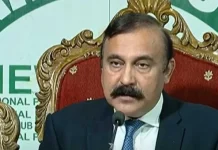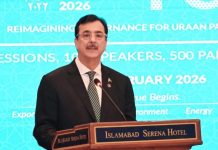ISLAMABAD: Federal Minister for Planning, Development and Special Initiatives, Professor Ahsan Iqbal on Monday inaugurated 49th International Nathiagali Summer College (INSC) on Physics and Contemporary Needs, marking a significant milestone in government’s efforts to promote excellence in emerging technologies and facilitate international collaboration in scientific research.
The summer college is being organized every year by Pakistan Atomic Energy Commission (PAEC) since 1976, aiming at transferring and sharing scientific knowledge among the scientific community.
Speaking on the occasion, the minister said INSCs have established a tradition of stimulating scientific activities, particularly in the field of Physics, often called the “bedrock of modern science.” He said, Physics plays a foundational role in our understanding of the natural world and underpins many technological advancements.
He said, the unwavering commitment of PAEC to host the Nathiagali Summer Colleges for the past 49 years was truly commendable. The minister also acknowledged the pivotal role played by PAEC in the scientific and technological advancements of Pakistan, including energy production, agriculture, medicine, and industry.
He said, over the decades, the PAEC has made significant strides in nuclear research and development, achieving remarkable milestones that have contributed to the socio-economic progress of our country. According to recent data, the PAEC generates approximately 8.2% of Pakistan’s total electricity, playing a crucial role in addressing country’s energy needs.
In addition to its contributions to energy and healthcare, the PAEC has actively supported research and education in nuclear science and technology, fostering a new generation of scientists and engineers equipped to tackle the challenges of the 21st century.
By investing in human capital and infrastructure, the commission has laid the foundation for sustainable development and innovation in Pakistan.
He said, while recognizing the transformative power of quantum science, the government has taken proactive steps to support the development of quantum technologies in Pakistan, adding that through strategic partnerships with leading research institutions, universities, and industry stakeholders, the government is investing in quantum research and innovation initiatives.
These projects aim to leverage Pakistan’s scientific expertise and technological capabilities to advance the frontiers of quantum science, computing and engineering.
In addition to supporting research and development efforts, the government is also investing in human capital development in the field of quantum science and technology.
Through scholarships, training programs, and capacity-building initiatives, we are nurturing the next generation of quantum scientists, engineers, and entrepreneurs who will lead Pakistan’s efforts in this exciting and rapidly evolving field.
Talking about Artificial Intelligence (AI), the minister said, the government has established National Centers of Excellence in key universities nationwide, fostering innovation in areas such as Artificial Intelligence, Cybersecurity, Big Data, Cloud Computing, Quantum Computing, Nanoscience and Nanotechnology, Additive Manufacturing, and Mathematics.
He said, AI has great potential and could contribute up to $15.7 trillion to the global economy by 2030, adding cyber-security was becoming increasingly critical, with the global cyber-security market projected to reach $345.4 billion by 2026.
The minister said, Pakistan remains committed to deepening and expanding its collaboration with CERN, the European Organization for Nuclear Research.
He said, the government envisions broader cooperation in areas such as particle physics, advanced materials research, and big data analytics. By participating in CERN’s cutting-edge experiments and projects, Pakistani scientists and engineers can gain invaluable experience and knowledge.
Additionally, the government aims to develop joint research programs and academic exchanges, facilitating the flow of ideas and fostering innovation. This collaboration will not only enhance our scientific capabilities but also create opportunities for our young scientists to contribute to groundbreaking research.
Among others, the event was attended by Chairman PAEC, Dr. Raja Ali Raza Anwar, foreign faculty members, scientists, engineers and scholars.






















